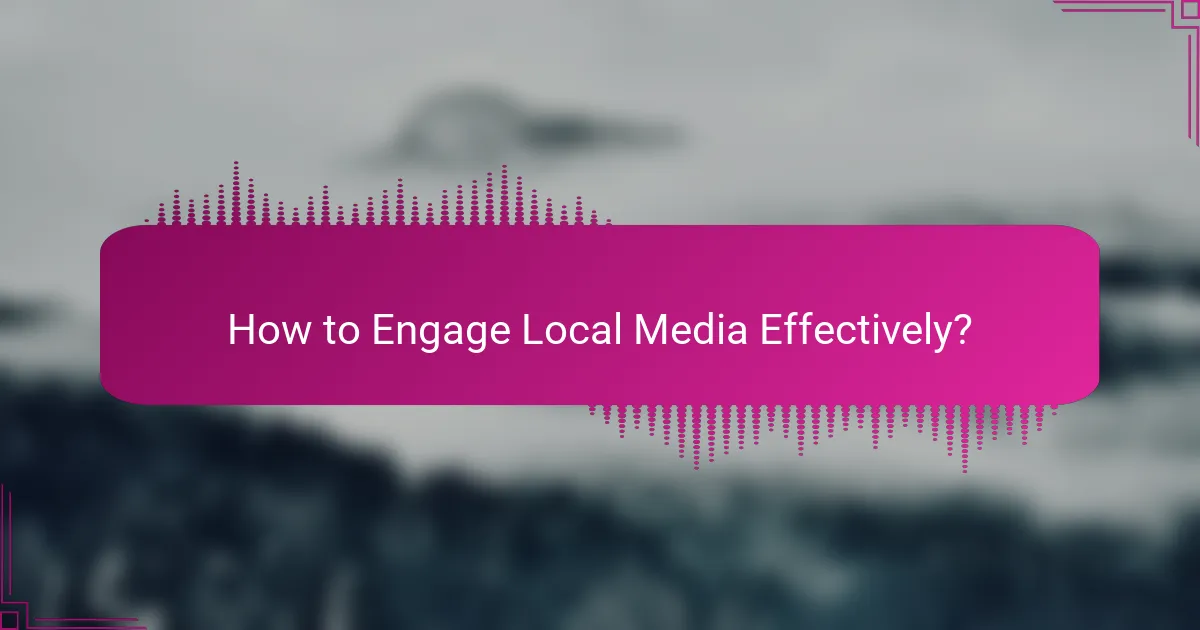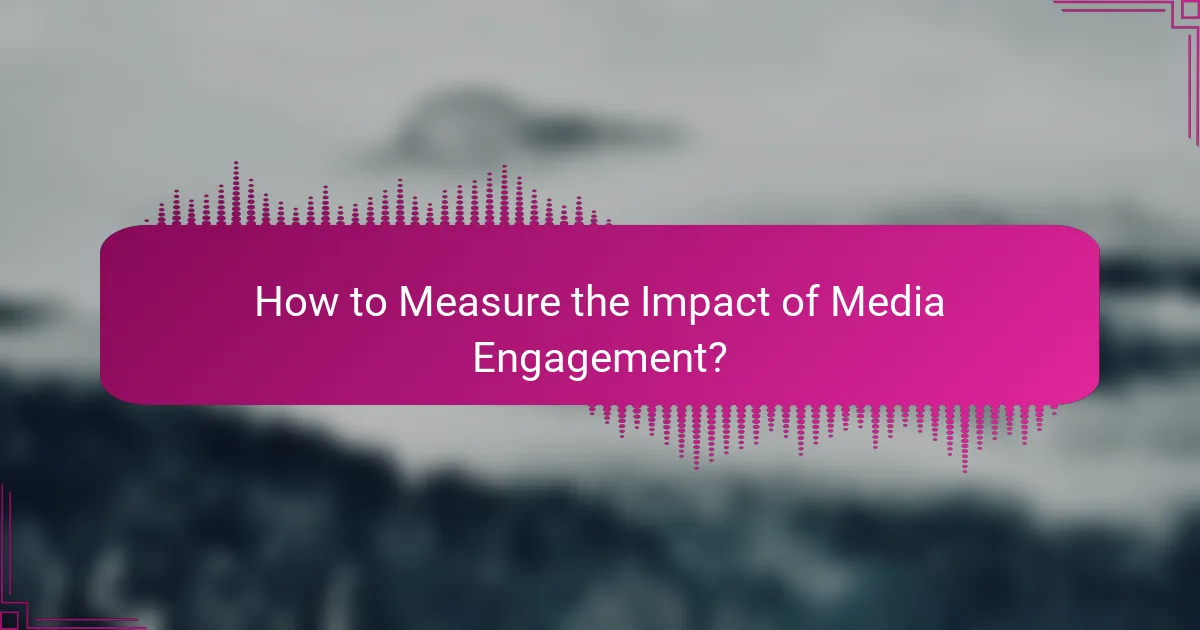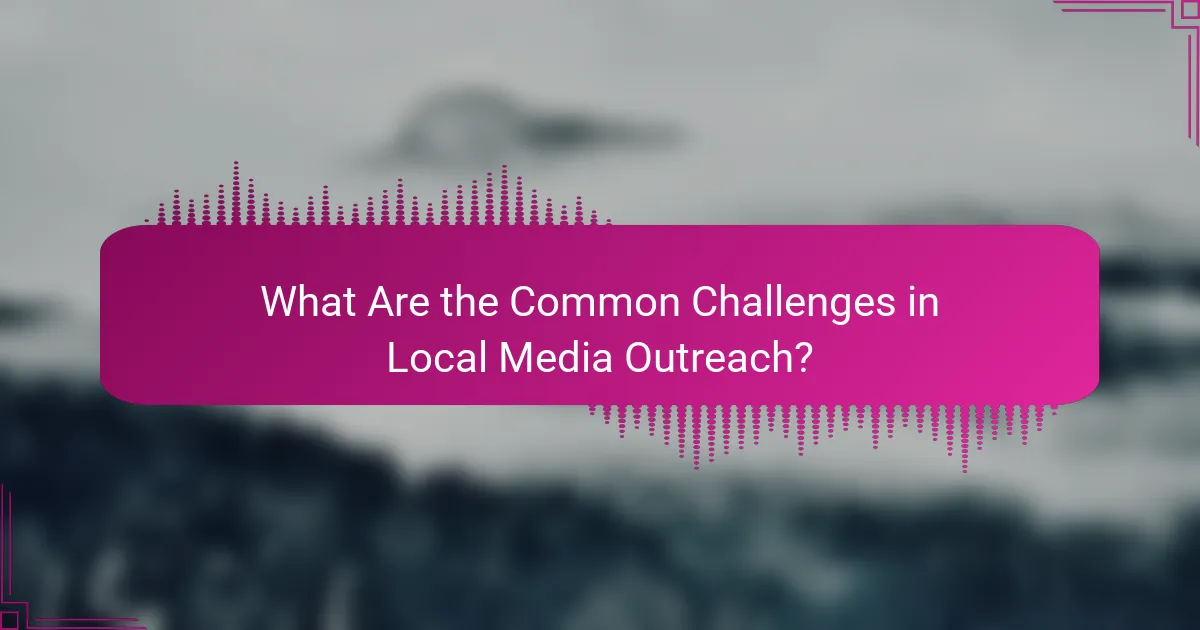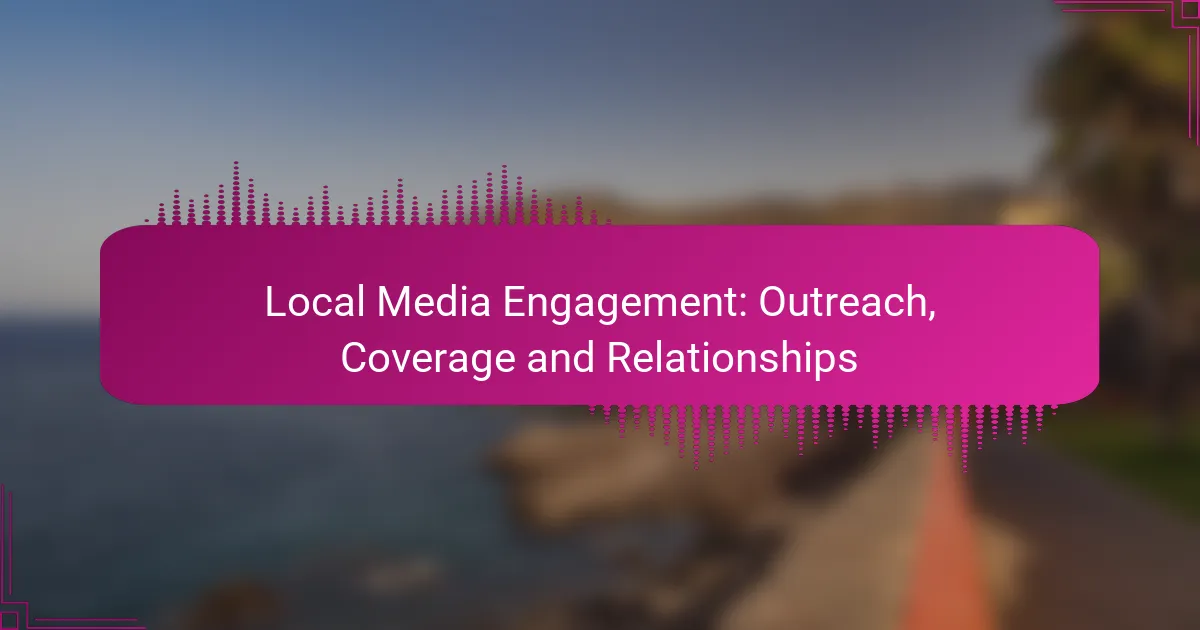Engaging with local media is crucial for enhancing visibility and building credibility within the community. By strategically reaching out, creating relevant content, and nurturing relationships with journalists, businesses can effectively connect with their target audience. This proactive approach not only boosts a brand’s presence but also fosters trust among potential customers.

How to Engage Local Media Effectively?
Engaging local media effectively involves strategic outreach, creating relevant content, and fostering relationships with journalists. By understanding the local media landscape and tailoring your approach, you can enhance your visibility and influence within the community.
Identify key local media outlets
Start by researching local newspapers, radio stations, television channels, and online news platforms that cater to your target audience. Focus on outlets that cover topics relevant to your organization or industry.
Make a list of these outlets, noting their contact information and the specific journalists who cover your area of interest. This will help you tailor your outreach efforts and ensure your messages reach the right people.
Craft tailored press releases
When writing press releases, customize them to fit the interests of each media outlet. Highlight local angles, community impact, and any relevant statistics to make your story compelling.
Keep your press releases concise, ideally one page long, and include a strong headline, a captivating lead paragraph, and relevant quotes. This format increases the chances of your release being picked up by local media.
Utilize social media for outreach
Social media platforms like Facebook, Twitter, and LinkedIn can amplify your outreach efforts. Share your press releases and news updates on these platforms to engage with local audiences and attract the attention of journalists.
Tag local media outlets and journalists in your posts to increase visibility. Use relevant hashtags to reach a broader audience and encourage sharing among community members.
Build relationships with journalists
Establishing relationships with local journalists is crucial for effective media engagement. Attend local events, invite journalists to your organization, or offer them exclusive interviews to foster connections.
Maintain regular communication with journalists by sharing updates and insights, even when you don’t have a specific news story. This helps build trust and keeps your organization top-of-mind for future coverage.
Leverage local events for visibility
Participating in or sponsoring local events can significantly boost your visibility in the community. Consider hosting workshops, seminars, or community service events that align with your mission.
Invite local media to cover these events, providing them with opportunities for interviews and stories. This not only enhances your media presence but also strengthens your ties with the community.

What Are the Benefits of Local Media Coverage?
Local media coverage offers numerous advantages for businesses, including increased visibility, enhanced credibility, and the ability to connect with a targeted audience. Engaging with local media can significantly boost a brand’s presence in the community and foster trust among potential customers.
Increased brand awareness
Local media coverage can dramatically elevate brand awareness by reaching audiences that may not be familiar with your business. When a story about your company appears in local newspapers, on radio, or through community television, it exposes your brand to a wider audience.
Consider hosting events or participating in community initiatives that can attract media attention. This proactive approach can lead to features or interviews that highlight your brand, making it memorable to local consumers.
Enhanced credibility and trust
Being featured in reputable local media outlets enhances your business’s credibility. Consumers often view media coverage as a form of endorsement, which can lead to increased trust in your brand.
To maximize this benefit, ensure that your messaging aligns with the values of the local community. Authenticity and transparency in your communications can further solidify trust and encourage positive perceptions of your brand.
Targeted audience reach
Local media allows businesses to reach specific demographics effectively. By engaging with outlets that cater to your target audience, you can tailor your messaging to resonate with local consumers.
Utilize local newspapers, radio stations, and community blogs that focus on your market segment. This targeted approach ensures that your marketing efforts are more efficient and impactful, leading to better engagement and conversion rates.

What Strategies Improve Media Relationships?
Improving media relationships involves consistent engagement, providing valuable content, and actively participating in the community. These strategies foster trust and collaboration, leading to better coverage and outreach.
Regular communication with journalists
Establishing regular communication with journalists is essential for building strong media relationships. This can include sending updates about your organization, sharing relevant news, or simply checking in periodically to maintain rapport.
Consider setting up a monthly newsletter or scheduling quarterly meetings to discuss upcoming projects and initiatives. Be responsive to inquiries and offer timely information to keep journalists engaged and informed.
Offer exclusive content and insights
Providing exclusive content and insights can significantly enhance your appeal to journalists. This could involve sharing behind-the-scenes access, early data releases, or expert commentary on trending topics within your industry.
For example, if you are launching a new product, consider offering journalists an exclusive preview or an interview with a key executive. This not only adds value for the media but also positions your organization as a thought leader.
Participate in local community initiatives
Engaging in local community initiatives demonstrates your organization’s commitment to the area and builds goodwill with both the community and the media. Participation can include sponsoring events, volunteering, or collaborating with local nonprofits.
By actively contributing to community efforts, you create opportunities for positive media coverage. For instance, hosting a charity event can attract local journalists, providing them with a story angle while showcasing your organization’s values.

How to Measure the Impact of Media Engagement?
Measuring the impact of media engagement involves assessing how effectively your outreach efforts translate into visibility and audience interaction. Key metrics include media mentions, website traffic from media sources, and social media engagement levels.
Track media mentions and coverage
Tracking media mentions and coverage helps you understand how often your brand or message is featured in local and national outlets. Utilize media monitoring tools to compile a list of articles, broadcasts, and online posts that mention your organization.
Consider categorizing mentions by sentiment—positive, negative, or neutral—to gauge public perception. Regularly review this data to identify trends and adjust your media strategy accordingly.
Analyze website traffic from media sources
Analyzing website traffic from media sources allows you to see how many visitors are coming to your site as a result of media coverage. Use web analytics tools to track referral traffic and identify which articles or broadcasts drive the most visitors.
Look for spikes in traffic following specific media mentions, as this can indicate effective outreach. Aim for a consistent increase in traffic after major media engagements, which suggests growing interest in your brand.
Evaluate social media engagement metrics
Evaluating social media engagement metrics provides insight into how your audience interacts with your content across platforms. Focus on key indicators such as likes, shares, comments, and overall reach to measure engagement levels.
Compare engagement metrics before and after media coverage to assess its impact. A significant increase in interactions can signal successful media outreach, while stagnant numbers may indicate a need for strategy refinement.

What Are the Common Challenges in Local Media Outreach?
Local media outreach often faces challenges such as limited resources and intense competition for attention. Understanding these obstacles can help organizations tailor their strategies for more effective engagement with local media outlets.
Limited media resources
Many local media outlets operate with tight budgets and small teams, which can restrict their ability to cover a wide range of stories. This limitation means that they may prioritize certain topics or events over others, making it crucial for organizations to align their outreach with the media’s focus areas.
To navigate this challenge, consider building relationships with journalists by providing them with valuable content that fits their needs. Offering exclusive insights or local angles can make your story more appealing, increasing the likelihood of coverage.
Competition for media attention
Local organizations often compete for the same limited media attention, making it essential to stand out. Events, press releases, and news stories vie for coverage, and only the most compelling narratives will capture a journalist’s interest.
To enhance your chances, craft a strong, concise pitch that highlights the unique aspects of your story. Use local statistics or human-interest angles to create a connection with the audience. Additionally, timing your outreach to coincide with relevant events or trends can improve visibility.
